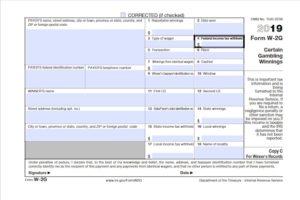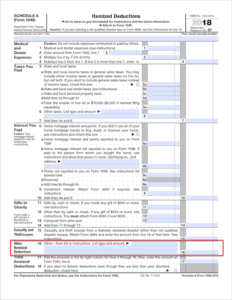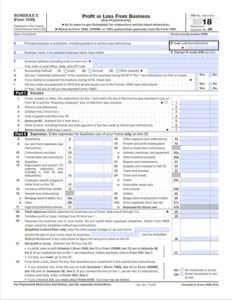2024 Online Gambling Taxes in the USA

Gaming Income
Gambling Taxes
What You Need to Know
Do you need to pay taxes on your gambling winnings? Yes. Gaming income is taxable like any other income you receive throughout the year. Whether or not you receive a W-2G from the casino, it is your responsibility to report “earned” winnings on your personal income tax form. As it does for land-based gamblers, the same applies to online casino players.
Casinos do not issue a W-2G form unless your jackpot is $1,200 or more. The operator is not required to issue a W-2G if your winnings are under $1,200. If you play real money keno, you won’t be issued a W-2G form until you generate $1,500 or more in keno winnings per play. Poker players need to fill out a W-2G form if they win $5,000 or more from a tournament.
Reporting Taxes on Gambling Winnings is Your Responsibility
As readers can see, each gambling game has its own threshold for reporting taxes. The responsibility is with you and not the casino, though, so if an operator doesn’t give you a W-2G form, you still have to report your winnings. Any cash you win is reportable.
When you win a large sum of money and the casino issues you a W-2G form, remember they automatically send a copy to the IRS. If you don’t report those winnings, you’ll be notified by the IRS that your tax return does not match their records. Report your winnings.
For those filling out a form in 2019 for a 2018 return, note that gross gaming income is reported on Form 1040, Schedule 1, Line 21 under “other income”.
Reportable Gaming Income
All the following forms of income from gambling need to be reported.
Online Casino Games
Online Slot Machines
Specialty & Lottery Games
Video Poker
Sports Books
Online Card Rooms
Promo Drawings
Mobile Casino GamesGames
Can Online Gamblers Report Net Winnings?
People often ask if they can report their net winnings – that is, the gross winnings minus their gaming losses. The answer is “No”. Place your gross winnings on line 21 of the tax return. Later, you’ll record your gaming losses for the year.
No matter what your losses for the year, line 21 only deals with winnings. Example: If you win $2,000 throughout the year playing online keno, you report that on line 21 whether you lost $200 or $20,000 playing keno.
Whether through oversight or bad practices, sometimes you might not receive a W-2G report from a gaming operator. If you don’t receive a W-2G, then you’ll have to keep track of your gross income number and report that amount to the IRS.
Gaming Losses
Gaming losses are reported on Schedule A (the itemized deductions) of the 1040 form, line 16, under the category “Other Itemized Deductions”. Once again, maintain a gaming diary or other running tally of your losses throughout the year if you want to legally deduct your gaming losses.
People ask us ways to lower the house edge at online casinos. I can think of no example which lowers your house edge more than keeping an accurate game log and deducting your losses.
One thing to keep in mind: a player’s gaming losses cannot exceed their winnings in a year’s time. If you win $1,000 and lost $2,000 over the course of a year, you report $1,000 in earnings and $1,000 in losses, even if your losses are higher than that. Also, you can’t carry losses forward to the next year. They’re simply lost.
2018 Tax Cut and Jobs Act
Taxpayers are reporting that the 2018 Tax Cut and Jobs Act has reduced their eligibility for itemized deductions. This eliminates the need for a Schedule A form, but also eliminates a place to deduct gaming losses. Each taxpayer faces their own situation, but many may not be able to shelter gaming income because of the new minimal gaming losses law.
To claim winnings and losses, it is incumbent for you to keep a diary or gaming log. Since you might not know how this is done properly, let’s take a look at what is required.
- When – The type of specific wager and the date it happened
- Where – The name and address of the gaming establishment, or its online equivalent
- How Much – The amounts won and the amounts lost
Player Records & Supporting Documents
The IRS recommends players keep supporting documentation for their tax claims. Keep bank statements, credit card statements, monthly online gaming site reports, and other game tickets you might have. Even if you don’t use bank wire transfers or other bank-related online payment methods, bank statements help you substantiate losses by showing corresponding ATM withdrawals and the like.
In the case of online casino gaming, it shows you moving money to a credit card, e-wallet, or crypto-currency wallet. Many land-based players keep their wins and losses on a player’s card or slots card. Online casino players have a cashier page. Also, sites with player rewards have a running tally of winnings and losses, so printouts of VIP program’s reports also help establish your numbers. Ask for your online casino to make a report of pertinent tax information.
Tips for Withholding Taxes
The team at OnlineUnitedStatesCasinos.com recommends the following tips for withholding taxes.
-
Deducting Taxes at the Time of Winning
Many gamblers prefer to have their taxes deducted from earnings at the time they have winnings. If you have earnings reported on a W-2G form, you can choose to have the taxes deducted at that time to avoid a big tax bill when you file your personal tax return. Consider this option if you tend to spend your winnings throughout the year.
-
Making an Estimated Tax Payments
Players who win in smaller increments and don’t have winnings reported on a W-2G form have the option of making an estimated tax payment based on the taxes you predict you’ll need to pay. To make an estimated tax payment, you’ll need to use a 1040-ES form.
-
Pay On Time – Avoid Penalties
Underpayment of income tax might result in penalties and interest being charged, so make timely payments to avoid further tax liabilities. A tax return has many factors which determine whether you owe a penalty, but paying into the system as you go is often the better choice for taxpayers.
Professional Gamblers’ Tax Returns
Professional gamblers face a different situation than amateur players or even high rollers do. A professional player is viewed as engaging in business, so their earnings go on a Schedule C part of a 1040 form.
While online casino gamers do not consider themselves professionals as often online poker players or sports handicappers, it’s important that those who do should file the proper tax returns. Also, the advice below applies to any professional online gambler.
What is the Definition of a Professional Gambler?
- A professional gambler pursues gaming full time and with great regularity. The professional gambler makes a good faith effort to generate income for a livelihood. Their gaming is no hobby.
- Someone claiming to be a pro gambler has the burden of proof to make that claim.
- One’s approach to gambling is considered. Does a person make a studied approach to gambling, forecasting the trends and opportunities as one would in a regular business environment?
- The recreational nature of gambling is compared to the for-profit aspect of gambling. Is the player more focused on profit’s or recreation?
- The gambler’s skill and expertise are considered, much like one would for any other profession. Does the gambler produce consistent results? How many years of experience does a professional gambler have?
- The amount of time and effort a player puts toward the profession is considered. Does a gambler spend full-time hours on their gaming activities?
- The history of losses with respect to activity is considered. Overall success thus becomes a major component of evaluation — in fact, the key part of the evaluation.
- Once again, the amount of accounting and record-keeping is a key determining factor. Is the player methodical in their approach?
Advantages of Declaring as a Professional Gambler
Declaring oneself a professional gambler has several advantages when filing a tax return.
- Deducting gambling losses – First, filling out a return as a professional helps a player deduct gambling losses. Such deductions largely have been eliminated for amateur players for 2018-2019 returns and beyond.
- Gaming as a business – Second, because the pro player treats their gaming sessions like a business, it also allows the player to deduct normal business expenses that further their professional career.
When playing online, expenses might include computer expenses, Internet service fees, research materials, and office supplies. If you have to travel for your gaming profession, then travel expenses, hotel rooms, business-related meals, and telephone bills might come into play. Anyone wanting to claim these expenses should document their expenses and keep the proper receipts.
The Flipside of Declaring as a Professional Gambler
One major drawback of reporting net gaming profit on a Schedule C form is the income is subject to self-employment taxes (in addition to normal income taxes). Even though a professional gambler will be able to claim additional expenses, the tradeoff might not be worth it. Analyze both possibilities (professional v. non-professional) before filing your return.
IRS Resources for Gamblers
 To read more about filing a tax return as an online gambler, go to the IRS websites to review their 2018-2019 publications related to gaming income. Read the current literature because the laws have changed significantly in the past two years.
To read more about filing a tax return as an online gambler, go to the IRS websites to review their 2018-2019 publications related to gaming income. Read the current literature because the laws have changed significantly in the past two years.
Suggested IRS Publications on Gaming Taxes
These are some of the suggested IRS resources players should review when it comes to their taxes.
- Publication 525: Taxable and Nontaxable Income – Covers gaming income and winnings.
- Publication 529: Miscellaneous Deductions – Involves gaming losses and proper documentation
- Publication 505: Tax Withholding and Estimated Tax – As the name states, involves tax withholding and estimated taxes.
- Publication 4706: You Won! What Now? – Informational brochure for individuals with information on reporting gambling winnings.




